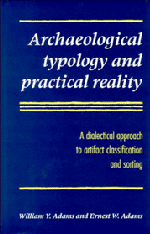 Archaeological Typology and Practical Reality
Archaeological Typology and Practical Reality Book contents
- Frontmatter
- Contents
- List of figures
- List of tables
- The archaeologist's preface
- The philosopher's preface
- PART I Introductory
- PART II The nature of types and typologies
- PART III Typology in action: the Medieval Nubian Pottery Typology
- PART IV Pragmatics of archaeological typology
- PART V Classification, explanation, and theory
- 22 The Typological Debate
- 23 Issues and non-issues in the Typological Debate
- 24 Conceptual problems
- 25 The use and abuse of theory
- 26 Paradigms and progress
- Appendices
- References
- Index
23 - Issues and non-issues in the Typological Debate
Published online by Cambridge University Press: 23 November 2009
- Frontmatter
- Contents
- List of figures
- List of tables
- The archaeologist's preface
- The philosopher's preface
- PART I Introductory
- PART II The nature of types and typologies
- PART III Typology in action: the Medieval Nubian Pottery Typology
- PART IV Pragmatics of archaeological typology
- PART V Classification, explanation, and theory
- 22 The Typological Debate
- 23 Issues and non-issues in the Typological Debate
- 24 Conceptual problems
- 25 The use and abuse of theory
- 26 Paradigms and progress
- Appendices
- References
- Index
Summary
In this chapter we want to identify some of the most important issues that have emerged in the course of the Typological Debate, and to discuss them in relation to our own point of view. Some of these are genuine issues that have been around as long as classification itself, and are certainly incapable of resolution. Others from our perspective are non-issues that have arisen through conceptual misunderstandings, or as a result of the intrusion of inappropriate theoretical considerations. The issues that are discussed here are obviously not all of equal importance, nor is the list comprehensive. In general we have selected for discussion those issues that are particularly relevant to our own interests.
Natural vs. artificial classification
This issue dominated the Typological Debate during its configurational/functional phase, but its origins are much older. In fact, it is surely the oldest and the most persistent of all classificatory controversies, tracing back in a certain sense to the age-old debate between “fixists,” who believe in a settled order of things, and “fluxists,” who do not. This question troubled both the Greek and the Chinese philosophers of ancient times (cf. Foucault 1973: 127–8).
The debate over natural vs. artificial classification was evidently flourishing in 1874, when W. S. Jevons published his path-breaking Principles of Science.
- Type
- Chapter
- Information
- Archaeological Typology and Practical RealityA Dialectical Approach to Artifact Classification and Sorting, pp. 278 - 295Publisher: Cambridge University PressPrint publication year: 1991


